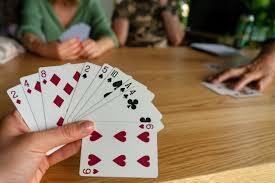-
Nieuws Feed
- EXPLORE
-
Pagina
-
Groepen
-
Events
-
Blogs
Why Position in Poker Is Everything (No, Seriously)

Poker position can make or break your strategy. Learn why acting last is the ultimate edge, how to exploit it, and why bad position feels like punishment.
Why Position in Poker Is Everything (No, Seriously)
If poker were a movie, your cards would be the actors, your bankroll the budget, and position? Position is the director. It quietly dictates how the scene unfolds, who gets the spotlight, and who ends up on the cutting-room floor.
And yet, MQM bet rookies love to ignore it. They’ll limp in under the gun with 7-9 offsuit like position is just a fancy word pros made up to sound smart. Spoiler: position is everything. No, seriously.
What “Position” Actually Means
Let’s kill the jargon: position in poker is simply where you sit relative to the dealer button.
-
Early Position (EP): You act first. Congratulations, you’ve won the prize of making decisions blind.
-
Middle Position (MP): Not great, not terrible. You’re basically Switzerland.
-
Late Position (LP): The promised land. You act last, with the gift of free information.
The later you act, the more you know — and in poker, knowledge isn’t just power; it’s chips.
Why Acting Last Is a Superpower
Imagine playing chess but knowing your opponent’s move before you make yours. That’s poker in late position.
-
Information Advantage: You’ve seen who checked, bet, or folded before you act.
-
Pot Control: You can decide to keep the pot small with marginal hands or build it with monsters.
-
Stealing Blinds: Acting late gives you prime robbery opportunities. Nobody fights back because they’re terrified of you having the goods.
In short: late position lets you play more hands, bluff more convincingly, and extract more value. Early position does the opposite — it punishes curiosity.
Early Position: The Danger Zone
Playing out of position is like texting your ex — sometimes it works, but usually it’s a disaster.
-
You’re betting without knowing what anyone else will do.
-
You can get raised off your hand easily.
-
You end up bloating pots with mediocre holdings.
The rule of thumb: tighten up early. Unless you like donating blinds, save the creativity for later streets.
Position by the Numbers
Poker strategy isn’t just “play good hands.” It’s “play good hands in the right spots.”
-
Early Position: Stick to premium hands (A-A, K-K, Q-Q, A-K).
-
Middle Position: Loosen up slightly — add suited connectors, mid pairs.
-
Late Position: Open wide. Small pairs, suited junk, even some complete trash if the blinds look scared.
In late position, you’re not just playing your cards. You’re playing everyone else’s hesitation.
Position and Bluffing: A Match Made in Heaven
Bluffing out of position? Risky. Bluffing in late position? Chef’s kiss.
-
You control the narrative. Checked around to you? Fire away.
-
Opponents are more likely to fold when they’ve shown weakness.
-
Your bets look stronger simply because you acted last.
This is why pros preach position: it makes bluffs cheaper and more believable.
Post-Flop Power Plays
Position doesn’t vanish after the flop — it becomes even more important.
-
In Position: You see what everyone does before deciding. You can float bets, trap opponents, or value-bet thin.
-
Out of Position: You’re guessing. You’re betting blind into uncertainty, which is basically paying extra rent in poker.
Being in position is like getting to peek at the answers during a test. Out of position is like guessing with your eyes closed.
Common Rookie Mistakes with Position
If you’ve been guilty of these, don’t worry — everyone has. (Well, except maybe Phil Ivey.)
-
Playing garbage hands early. Don’t. Just… don’t.
-
Forgetting position post-flop. Just because you had kings pre-flop doesn’t mean you can survive out of position on an ace-heavy board.
-
Defending blinds too wide. “But I already put chips in!” Yeah, so does everyone who buys a gym membership and never goes. Let it go.
Why Position Is Poker’s Real Edge
Here’s the secret: most players aren’t terrible at picking starting hands. Where they leak money is ignoring position.
Two players can have the same cards, but the one in late position will almost always make more chips. That’s not luck — that’s leverage.
Position doesn’t care if you’re a beginner or a seasoned pro. If you use it well, it rewards you. If you ignore it, it punishes you.
Final Hand
Poker is a game of incomplete information, and position is the cheat code that fills in the gaps. The later you act, the more you know, the more you control, and the more you win.
So yes, position is everything. No, seriously. Ignore it, and you’ll keep wondering why your “premium hands” keep losing. Respect it, and suddenly the game starts making a lot more sense.
Play Smart
Next time you sit down, treat position like your most important tool. Tighten up early, open up late, and remember: acting last is the closest thing poker gives you to superpowers. Use them wisely.
- Art
- Causes
- Crafts
- Dance
- Drinks
- Film
- Fitness
- Food
- Spellen
- Gardening
- Health
- Home
- Literature
- Music
- Networking
- Other
- Party
- Religion
- Shopping
- Sports
- Theater
- Wellness


